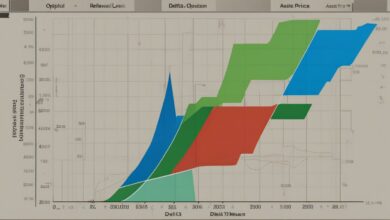Can You Buy Options After Hours?

Are you wondering if it’s possible to buy options after hours? After hours options trading offers a unique opportunity for traders to participate in the market outside of regular trading hours. In this article, we will explore the ins and outs of after hours options trading, including how it works and the considerations you need to keep in mind.
Key Takeaways:
- After hours options trading occurs between 4 p.m. and 8 p.m. ET, outside of regular market hours.
- Trading options after hours comes with different considerations and risks compared to trading during market hours.
- After-hours options trading operates through the stock market’s electronic communication network (ECN).
- Anyone with an online brokerage account that supports after-hours trading can participate in after hours options trading.
- After-hours options trading offers convenience and flexibility for those unable to trade during regular market hours, but it also comes with lower liquidity and increased price volatility.
How Does After-Hours Options Trading Work?
After-hours options trading operates through the stock market’s electronic communication network (ECN). When an order is submitted after hours, the ECN’s automated computer system looks for a match with another trader’s order. If a match is found, the trade is executed. If no match is found, the order is canceled by the time after-hours trading closes at 8 p.m. ET.
It is important to note that after-hours trading follows a specific schedule, with different trading hours for stock options, ETF options, index options, and currency options. This schedule varies depending on the market and is generally between 4 p.m. and 8 p.m. ET.
After-hours options trading relies on the electronic communication network to match orders and facilitate trades. This system allows investors to continue trading beyond the regular market hours, offering increased flexibility and opportunities for buying and selling options at different times.
During after-hours options trading, the ECN scans and matches orders, providing a platform for traders to execute transactions. The matching process ensures that trades are completed promptly and efficiently.
In addition to the trading schedule and matching orders, after-hours options trading provides a unique environment where traders can take advantage of potentially less competition and increased volatility. However, it is important to consider the potential risks associated with lower liquidity and wider bid-ask spreads during after-hours trading.

Can Anyone Trade Options After Hours?
After-hours options trading is an exciting opportunity for investors to extend their trading hours and potentially capitalize on market movements outside regular trading hours. Previously, after-hours trading was limited to institutional investors, but now retail investors can also participate in the after-hours options market. However, it’s crucial to understand the availability of after-hours options trading, the brokerage requirements, and any associated fees or restrictions.
Most online brokerages offer after-hours options trading, but it’s essential to check if your brokerage supports this feature. Some popular brokerages known for their after-hours options trading availability include:
- WeBull
- Interactive Brokers
- E*Trade
- Robinhood
- TD Ameritrade
- TradeStation
- Vanguard
Before diving into after-hours trading, it’s vital to review your chosen brokerage’s after-hours trading session hours, any associated fees, and specific requirements. This ensures you have a clear understanding of the availability and conditions of after-hours options trading.
Brokerage Requirements for After-Hours Options Trading
Brokerages typically impose certain requirements for clients interested in trading options after hours. These requirements may include:
- An active online brokerage account: You need to have an established online brokerage account with a platform that offers after-hours options trading. Ensure your account is funded with sufficient capital to cover any potential trades you wish to make.
- Options trading approval: Some brokerages may require clients to have options trading approval within their accounts before granting access to after-hours trading. Options trading approval often includes providing information about your trading experience, financial position, and objectives.
- Understanding of the risks: After-hours options trading comes with additional risks compared to regular market hours. It’s crucial to have a strong understanding of options trading, market dynamics during after-hours sessions, and the potential risks involved. Educational resources provided by your broker and further research can aid in gaining this knowledge.
Benefits of After-Hours Options Trading
Trading options after hours offers several benefits to investors. These include:
- Convenience and flexibility: After-hours trading extends the time available for trading, allowing investors with busy schedules to trade outside regular market hours.
- Opportunity for price gaps: Overnight news or events can create significant price gaps that can be capitalized upon during after-hours trading.
- Potentially lower competition: After hours, trading often sees lower participation from institutional traders, providing retail investors with reduced competition and potentially better trade execution.
However, it’s important to consider the potential drawbacks of after-hours options trading as well. These include lower liquidity, wider bid-ask spreads, and increased price volatility due to the reduced number of participants and limited trading volumes.
By thoroughly understanding the availability, brokerage requirements, and associated risks and benefits, investors can make informed decisions about whether to trade options after hours. It’s crucial to develop a solid trading plan and exercise caution when entering the after-hours options market.

Pros and Cons of After-Hours Options Trading
After-hours options trading offers a range of benefits for investors looking for convenience and flexibility outside of regular market hours. One of the key advantages is the potential to take advantage of overnight news or events that can lead to significant price gaps. This allows traders to react to market-changing developments and potentially profit from these movements.
Another advantage of after-hours options trading is the lower competition from institutional traders. During regular market hours, institutional traders dominate the market, which can make it difficult for retail traders to compete. However, after hours, the playing field is more level, providing an opportunity for retail investors to find potentially profitable trades.
Despite these benefits, it is important to consider the drawbacks of after-hours options trading. One of the main challenges is the lower liquidity during these hours. With fewer market participants, it can be harder to execute trades at desired prices, and the bid-ask spreads may be wider due to the lower liquidity. This can impact the overall cost of trading and potentially erode profits.
Additionally, after-hours options trading is associated with increased price volatility and fragmented markets. The lack of liquidity and lower trading volumes can lead to sharper price movements and unpredictable price action. Traders need to be skilled in managing this heightened volatility and understand the specific risks involved during after-hours trading.







